
Esta resenha pode conter spoilers
I have not seen the Korean drama or read the original webtoon, so I cannot compare them to this Japanese version. Nevertheless, this version has a distinctly "Korean feel" to it. Especially the love triangle (quadrangle?) and the fight against a power-hungry chairman of a huge conglomerate are plot points I've seen in several Korean dramas.(But I trust that the story was Japanese enough for the Japanese producers to make an adaptation.)
I liked the basic idea of a young man seeking revenge for a wrong done to him and his father -- with the help of friends he makes along the way.
(I wonder; if this had been an original idea, what would a Japanese writer have done with it? More friendship and group action, less love triangle, I hope.)
Also, the pacing and story managed to keep my interest until the four-year time skip. After that, I found a lot of the plot points superfluous and the rest dragged on.)
--spoilers start here--
I also did not like most of the characters:
* Aoi who was introduced as a high school brat, is suddenly a more than capable manager? At twenty? I find that not believable, especially as her main motivation is her "love" for Arata -- which feels more like a childish crush to me.
* Arata who is supposed to have strong morals, and put people before profit in the first episodes, becomes more and more ruthless and lives only for his revenge -- he even has no answer to the question "What are you going to do after?" for most of the series. That character devolpment could have been interseting but then they should have addressed it more.
* Riku, who was fine as a character, but until her surgery looked more like a FTM transgender person than a MTF transgender person. Also, why did they choose a biologically female actress? Were there no adequate male actors willing to play her? (I have no idea whether there are actual transgender actors in Japan who could have taken the role, which would have been the best choice.)
* Yuka was interesting for a lot of the episodes, because her actions were rather ambiguous. She was a character with shades of grey -- but unfortunately she was also too passive, waiting for Arata to "save her", whatever that meant.
* Ryota, the ex-criminal, had not enough screen time to develop his character. He's an example why I am not fond of time jumps -- what happened to him in the time when RC grew and he had to change his position? He started a an uneducated ruffian -- how did he manage to change to managing director?
* The one I felt the most sympathy for was Ryuji, who was the most likeable among the bunch. But why does his only reason for doing what he does have to be his "One True Love"(TM)? There are so many other motivations than that!
The Nagayas (father and elder son) were fantastic enemies though! No complaints here!
All in all, I do not regret watching it, but I wouldn't necessarily recommend it to others -- there are better dramas out there.
Esta resenha foi útil para você?

A light-hearted, cute simple little love story about two marathon runners in college
While this is not my favourite BL of all time, it is one of the go-to BLs whenever I need a short pick-me-up.The series and the drama are identical, there are just a few scenes swapped around where the episodes end / start, probably for narrative reasons.
What I liked:
* They chose a story line that is adequate for the length of the series. Anything more complicated, and it might have become frustrating (again).
* The series is focused on the two main leads, which are supported by only a few other characters, which also fits the drama's length. I loved all of them, the coach was like an exasperated but loving uncle, the friend insightful, the two loan sharks hilariously cute.
* They did almost everything to keep the story light-hearted, from the sometimes cheesy dialogue to the upbeat music.
* The story, though straightforward, shows quite a bit of character development for BOTH main characters.
What I did not like:
* To keep it consistently light-hearted, I would have liked if the scene with the loan sharks' boss could have been less violent -- I'm sure there was another way to put pressure on SangHa than to beat him up.
Overall, a sweet and short drama.
Esta resenha foi útil para você?

Esta resenha pode conter spoilers
This is oe of the worse short K-BLs I've seen. The premise is fine, but how they told the story in the second half made it fall apart completely. Did the people who were responsible not get feedback from someone else?What I liked:
* I loved the relationship between Yeong Woo and his father. Even if there are only a few scenes with them both, I have a distinct impression on how growing up must have been for Yeong Woo with this father, and for the father, raising is son to be an independent, and kind person. You see, it IS possible to establish how people feel about each other in just a few minutes of screentime!
* Stories not set in college or high school are always a plus for me. I liked that Yeong Woo was of a lower or middle class background. I also found it very relatable that he did not know what to do with his life.
What I did not like:
* The two main leads got too close, too fast for my liking. I've never talked to people I've only met three or four times about my most initmate dreams and hopes for the future.
* The show seems to follow the precept of "show, don't tell". The thing is, if you show only fragments, and we, as the audience have to guess what is going on, we won't be very satisfied. This becomes especially clear just before and after the time skip, where we only get to see disjointed scenes, sometimes without context. If we don't even get clues to guess, then it only becomes an exercise in frustration.
Some examples: Why the crying at the traffic lights? Where was Ki Jin during the time skip? When did Yeong Woo become a model, and how does he balance this with his delivery job? Where is his mother? Why is the friend also back? Did they ever talk about their breakup? What happened between Yeon Woo and the friend in the past? (Were they lovers? Friends? Rivals? Just classmates?)
I don't get why "follow your dreams" and "be with the one you love" have to be an either-or-decision. Long-distance-relationships? Talking about things and then compromising? That's apparently nothing that exists in this world.
All in alll, the drama feels more like an outline for the first few episodes of a longer story, not something you would consider complete and fit for release.
You can watch it, if you like, since the show is rather short, but I'd recommend to give it a miss.
[This is a slightly edited version of the review I posted on Viki.]
Esta resenha foi útil para você?
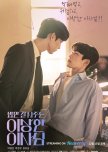
Esta resenha pode conter spoilers
The premise is great; the runtime too short.
The idea to blend an office setting / a boss-employee-dynamic with a fantasy plot of reincarnation and curses which have to be broken, is interesting.Unfortunately, the boss-employee-dynamics with its inherent power imbalance is only kind of important in the beginning -- for me, Dong Baek was much too accepting of Yu Dam's story. But that may be because I did not feel a connection between the director and his employee. The director was so standoffish at the beginning, and then suddenly, he is concerned annd worried? The employee is confused and more than a bit uncomfortable, and then, suddenly -- love? A bit more time for character development would have been nice.
I think there's a lot of more character back-story and world-building here than we get to see; and this is what makes the whole series feel unfinished. It is as if we get an incomplete puzzle and are asked to fill in the missing pieces ourselves, and the pieces that are there are just the people, and none of the surroundings.
We don't know why it was so important that the "child of god" / "the kid who grew up in the shaman's house" not get a name. We don't know who it was who shot Dong Baek (looked like Dennis, maybe?) and why. We don't know what kind of curse it is and how exactly it can be broken. And we don't know how Yu Dam knows. We don't know who is was who possessed Dong Baek that one time. We don't know anything about Dennis, and why he thinks so lowly of Yu Dam.
The list could go on and on.
I don't understand why those who were responsible chose this story when it was clear that there's not a lot of time to fully explore it. Even a 10-episode drama of 25 to 30 minutes per episode would have been enough to at least explain the most pressing questions.
But if you know that you don't have the time, then why not choose a much simpler story?
As it is, most of the episodes felt rushed or disjointed (or both); which is a pity since the acting and most technical aspects were fine.
The ending .... is probably something people love or hate. It's open-ended bt hopeful; and I think it fits so I like it.
If you're interested and have the time, you could watch it -- it's short enough and certainly not bad enough -- and form your own opinion.
Esta resenha foi útil para você?

Esta resenha pode conter spoilers
I watched this and the series version side-by-side. Apart from a few scenes that were switched around, both versions are identical; the movie feels more like a cohesive whole since it isn't interrupted every few minutes. If you want to watch this, you should choose the movie if you can.What I liked:
* the beautiful scenery at the ocean
* the simplicity of the story
* Han Gi Chan's acting
* Also, stories that are not set in highschool or college are always welcome.
* The Ex-boyfriend. It was a nice touch, not to know at the beginnning what to expect from him, and to discover in his third scene what he is actually like.
* The story didn't make use of the typical BL tropes, only standard romance tropes. The gender of the two protagonists actually did not matter much, which is always nice, if you want a light romance.
The story though has some qusetionable parts:
* I have so many questions: Where does Tommy come from? What is his motivation in staying with Ba Da? -- Why is Tommy there, right behind the car, at the beginning? Was it an accident, did he get in the way intentionally, did he just lie down there? -- Why does a chef buy at the grocery store?
* The gap year -- Why should two adults not know to try a long-distance relationship? What did Ba Da do while he was not at his small establishment and why did he decide to come back? What was the motivation for Tommy to return, and why at this point of time?
Holland's acting is, unfortunately, not suited for his role. I'm sure he did his best, but it seemed stiff to me, and even after rewatching I'm not always sure how his character feels. Especially since we only get Ba Da's POV, and Tommy doesn't really talk about his life, we have to rely on body language. I didn't, for example, notice that Tommy actually comes on to Ba Da until I watched the story for the third time.
Overall impression:
This is a nice and simple story, that focuses on few characters, sets and a single storyline. It didn't waste time on too many flashbacks or scenic shots, just enough to set the mood. The makers obviously used what they had wisely and tried to make a good story within the short time of an average movie.
I still would have wanted more info, be it explicitely stated or implicitely shown, to understand the motives of both main leads. Things are often too subtle to see them during a casual watching, or did you notice that Ba Da says in minute 33 of the movie "I didn't come here to do this?" and probably means that he notices a certain kind of attraction to Tommy? I didn't, and there are some other points where I'm really not sure if we get the intended message.
That subtlety doesn't mix particulary well with Holland's acting style.
Still, it's a nice movie to spend a lazy afternoon or evening on, even worth a rewatch or two, if yu need to shut off your brain. It's not an outstanding masterpiece but certainly better or at least not worse than some het romances.
Esta resenha foi útil para você?

Esta resenha pode conter spoilers
It feels like the writer had four or more different ideas for a story, couldn't develop any of them enough to fill all the episodes, and then decided to just throw them all together like Dr Frankenstein when he created his "human being".The four stories are:
* A silly time travel story with supernatural elements
* A story of corporate intrigue
* An office romance
* A story about finding yourself and your place in life.
I loved the first episodes (Time-travel story with lots of silliness and over-the-top acting) -- loved many of the elements, such as the deities using modern communication, the inclusion of Covid, Ho Bo Wei's attempts to return to his time and the developing relationship between Ho Bo Wei and Hai Yi. I wish they had shown more scenes of Ho Bo Wei marvelling at the development of his hometown, of him using his ability to find anything and everything, and more of the supernatural elements (I would have liked the god's backstory and how the Jade Emperor reacted to his mistake).
But then this plot is (almost) completely dropped and the second story about the corporate intrigue starts. Both main characters seem to change their whole personality -- Hai Yi turns into a closed-off, workaholic person (which, at least, is explained later) and Ho Bo Wei is suddenly a whining guy, whose only goal in life is to get together with Hai Yi. The sexual tension that had been building up completely disappears in favour of one person lying and not telling important things and the other (of course) completely misunderstanding. These episodes made me dislike both of them, and I almost gave up.
This story, too, could have been something good -- but on its own, not in conjunction with the time travel part, and without so much one-sided lying.
It is only in the last two episodes that the first story is taken up again, and underwhelmingly "resolved".
Some other minor plot points that are dropped, and sometimes picked up again -- the god, who is responsible for this whole thing, shows up and disappears again; the girl disappears for several episodes, shows up briefly because they needed a female person who can play pregnant, and disappears again; Covid plays an important role in the beginning but then everyone just walks around without masks or anything -- except when it is needed for the story.
The parallel story of the second couple does not have this problem of trying to tell two stories in one, but I hate how the managing director lies to his future partner from the very beginning. He does explain his decisions at the end, but it still doesn't sit right with me, and I don't think it's a good basis for a balanced and trusting relationship, especially as there is somewhat of an age difference.
I think this could have been much better if someone else had a look at the script and made a more cohesive story. Or, alternatively, go back to the roots of the HIStory shows, and tell one story in just a few episodes, like in HIStory 1 and 2.
Since others seem to like it, go and try for yourself, but I won't be coming back to this show.
Esta resenha foi útil para você?

Esta resenha pode conter spoilers
Cute cat-boy story about a lonely man finding his family
If you're famiiar with "cat boys" and all the tropes that come with it, you'll already know how Meow will be portrayed: as a naive and innocent, sometimes childish, always playful, very young-looking boy with a slight build and a smooth and soft face.If these stories about cat boys (whether in fan fiction or in manga/manhwa/manhua) do not devolve into straight-up porn, they usually stay light-hearted, soft and very, very cute. This one stays consequently on a PG level of intimacy, there's some toe holding, hand holding and one cheek kiss (where the kisser has no romantic intentions).
Content warning for some animal abuse, although we don't see any bodily harm.
First: The acting is okay. We are used to the newbies in Thai productions. and this is a bit above average. The main characters' actors, James and Gap, are more than above average, Gap did well in portraying his change from lonely artist to overwhelmed room-mate to a guy who is very much in love. James is a perfectly innocent cat-boy, showing every bit of his emotions very clearly, but without more exaggeration than the genre needs.
Second: The intro song is annoying, but bearable, the rest of the background music non-remarkable.
Third: I liked the sets, the locations and the editing. Not outstanding, but never empty and always realistic, fitting to the genre.
Fourth: I would have liked the ears to look a bit more realistic, and there were some instances when the actor's earlobes were visible.
Regarding the story, the series shows its manhua roots -- I did not find much about the original material; it seems that the manhua is at least 68 chapter (or books?) long; the few episodes of the anime version that I found were only a few minutes long. I suppose (and I just extrapolate from other manga and manhwa) that the oringinal material is one of those episodic endless manhua that never go anywhere, have little to no character development, and have no "ending", because if the couples would become official, the seres would be over. I guess that this is the main reason that this live action series's ending is more open. (Also, would anyone call someone their lover if their relationship is still unclear? Of course they don't.)
I would have loved to see more backstory for Meow, and I'm unsure if it's because of time constraints of the series or if the original did not provide more info? I do wonder why Meow is more childish than other members of the Ear People -- he's obviously slower to learn, but it also seems as if he's been sheltered from the wider world by his adoptive family? There's been some allusion to mistreatment as a little kitten but that doesn't explain everything.
Considering all the couples have the potential for power imbalance (adult / child-like cat boy, student / teacher, boss / intern) -- there's no need for concern here. The partners with more power never misuse this to push anything. The female couple is the most balanced -- while one is the bss, the other's compliments and clear adoration always melts the boss's heart. The second male couple also has its balance -- it's the student who would like to have more intimacy and tries to get closer. /Also, I think that Evan is more of an assistant than a full professor?)
Considering the main pairing: Even though Dermden (the adult artist) feels some kind of attraction in the first episode already, which evolves into love, and even though he would very much like to have a romantic relationship with Meow, he never acts on it. He even avoids situations where he could potentially cross boundaries, to Meow's great confusion. In the end, Dermdem is just happy that he has Meow in his life, and he'll take anything he'll get.
Overall, a nice and light watch, if you can accept all the tropes that come with cat boys and if you like some innocent romance.
Esta resenha foi útil para você?
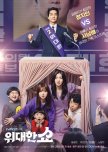
Esta resenha pode conter spoilers
I should learn that the first episode in Korean dramas is never helpful in deciding which plot and tone the other episodes will have.What I liked:
* I liked Wie Dae Han's character and its development throughout the series. He's a man who once had a very clear reason for going into politics but has lost it -- and is struggling to find it again through much of the series. That makes him a very flawed character, who are the best in dramas.
* My favourite character by far was Kang Joon Ho though, who had struggles all of his own -- who has to decide if he'll put his personal integrity above his familial ties.
* I also loved the supporting characters, foremost the aide, the Jung family, the kids, and the young ex-trainee. All of them were not only there for comic relief but also for the plot.
* I liked that on the politics side of the plot, the elements fit together and made a whole.
The whole drama is very much about personal values, and what it means to be a family and a good family member to the others, I think -- not only Wie Dae Han and Kang Hoon Jo have to learn but also the kids' father (I forgot his name), Kang Kyung Hoon, Han Tak...
What I did not like:
* They could have done away with the romance. Love triangles are overdone anyway, and in my opinion the romance did not add anything to the plot or the character development. Jung Hyun Soo could easily have remained a friend and colleague (she had enough reason for engaging with Wie Dae Han's daughter all of her own). Kang Joon Ho had more chemistry with Wie Dae Han than with her -- why not play up the rivals-since-school-days-angle instead of a lacklustre romance? Regardless who she ended up with, I really was not interested. I hate that writers think they have to force (het) romances into their stories.
* I would have loved to see more of the kids' stories instead. Han Tak was a really interesting character, and also Song Yi and her anxieties ould have been interesting to learn more about. Or what about the boy's need for eating and jumping around? There's more story there.
* I think this would have made the drama more interesting -- it was rather lengthy from episodes nine to eleven, which is where the romance subplot was most apparent. It was decent before, when it was about Wie Dae Han and the kids, and after, when the race for the election picked up.
* All in all, I was again disappointed by the female characters. The girl had spunk in the beginning but the got reduced to her role as impending mother, Jung Hyon Soo was overly emotional, the female journalist was a strange mix of ambitious and passively accepting the men's plans.
Overall, it's okay to watch. The ending was rather predictable -- but still I liked the character development we got to see.
Esta resenha foi útil para você?

Ten minutes in, and I already checked the comments here if I was the only one who was reminded of mflow productions or maybe "A Secretly Love".
Thirty minutes in, and I was ready to stop watching. To give this drama a fair chance, I finished the first episode (which means I've seen 20% of the whole drama), but no more.
So, what made me drop it?
* The show introduced too many characters too fast. If I hadn't read the synopsis, I wouldn't have known who the main characters were for a while -- and it's not very clear how many of the side characters will even be important. Having that many side characters in a series with five episodes can only mean that either most of them are not important or they won't have any personality or their own story at all.
* It feels as if too much happens at once, and at the same time, nothing at all. Scenes that could have told us something about Cake and Kla felt rushed, while other scenes seem to have no purpose at all.
* The acting is miserable. There were two or three small instance where it was good, but overall -- have these people taken acting classes at all?
* If you're doing a drama with high school flashbacks that are more than a minute long, you should choose actors who can pass as a teenager.
* I don't usually mind Thai sound effects, but there were at least two scenes when the sound effects did not match the tone of the scene at all.
* Also, in a scene with Game and Boon doing a live stream, there was an obvious cut while they were sitting in front of the camera. These kind of scenes should only be shot as one long take, or, if you can't avoid cutting for whatever reason, show something else for a bit.
* Game wears glasses without lenses.
* I couldn't build a connection to Cake and Kla at all. Who are they? Why should I care about them? It's a bit better for Kla, but Cake is completely bland -- they obviously tried to make this character fit into the "bottom"-mold with cutesy behaviour but forgot to tell us about his personality.
If it had been only two or three of these problems, then I might have continued or, at least, not give na rating. But all of these combined make for a poor drama.
I did like the setting before and during the Covid epidemic (gave a point for that), and a lot of details reminded me of that time -- but there are also questionable choices, for example, why did Kla meet with the client in person? Shouldn't have that been a video call?
We also don't get a good time line here. I thought that we were still at the beginning of the pandemic, but then Kla did a home test -- those were only available after months and months of the epidemic (at least in my part of the world).
After the first episode, I already have enough of this drama. For those who like it, enjoy!
Esta resenha foi útil para você?
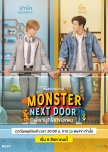
Esta resenha pode conter spoilers
Soft and gentle, communication is everything
"Monster Next Door" is one of those gentle and soft romance dramas that are more about two people of opposite characters slowly getting closer to each other and finding a good balance in their relationship than it is about external conflicts.As such, it can be either comforting or boring, depending on the personal taste and mental state of the viewer.
The tl;dr:
1. Is it good? -- It's certainly in the upper third of this year's Thai BLs, but it's not top-tier -- the overall production quality is good, acting is solid, and here are little to no plot holes. Regarding flaws, see below.
2. Did I like it? -- Yes, I enjoyed it immensely. I chose a time when I was in the mood for a light watch, with a soft and gentle couple, and this hit the spot. More on that, see the paragraph directly below this one.
3. Do I recommend it? -- I do. But only for those who are looking for a gentle low-stakes love story, where nothing hurts (much, or not for long), that has mostly but not only fluff.
I love how the drama shows us a couple who resolve their problems with open communication and gentleness, and try to understand and accommodate each other.
Park and Big represent their roles well -- one is more reserved and sometimes you have to look closely to understand how he feels, while the other telegraphs everything. The supporting friend group is hilarious, and both couples' stories fit well within the plot. I like the sets, the use of colours -- and even the opening song grew on me.
I very much liked it as a stress reliever and diversion from work and life, the drama is perfect for that.
(As an aside for those who have not watched this yet or were confused: Near the end of epiosde 1, God asks Diao to become คนคุยกัน /khon khui gan/, literally "people who talk with each other" -- it's translated as "dating" in the subtitles, which gives a wrong impression. /khon khui/ are two people who will meet up often, "talk" with each other, to get to know each other, with the prospect of a romantic relationship at a later stage. I don't think Western cultures have this exact same thing, so it's really hard to find an expression for it in English.)
Coming back to the drama; even if I like it a lot, there is one major and some minor irritants.
The one major irritant is Khun Shy's living conditions. Khun Shy is Diao's much beloved turtle -- for him, Diao even asks his neighbour for help, even if he doesn't quite trust him at this point. So, apart from the fact that it hurts every time we have to watch Khun Shy desperately trying to escape his prison, it also does not make any sense within the story that his cage is so small.
Everything else in both Diao and God's rooms is lovingly chosen and presented by the production team -- these rooms represent their owners in style, displayed items and colour scheme. Why then, is this not true for Khun Shy? Diao's love for him should have been reflected in the turtle's living condidtions. You can't tell me that someone like Diao, who has been obsessed with turtles his whole life and loves his own little turtle very much would *not* dedicate at least half his living space to a luxurious habitat for Khun Shy?!
It is a grave mistake on the side of the production team that they did not see this.
There are a few minor irritants that could have been avoided with a few more passes over the script and the editing -- the whole drama does not feel as polished as it could have been. Quite a few of these things I have also seen in other Thai BL production, so "Monster Next Door" is not alone in this. But given the care the drama shows in other aspects, it's a pity that these little splinters are left.
What follows now is what the Germans call "Meckern auf hohem Niveau" -- "complaining on a high level". When something is well done in comparison to other similar things, it's sometimes even easier to point out remaining flaws; to wish that something good could be even better, if not perfect. So, yes, even if the following text got quite long, the flaws really ARE minor.
I'll just list a few examples, to make my point clearer (some spoilers ahead!):
* There are many smaller excellent ideas. For example, the "angel" and the "devil", who represent the "introverted" and "extroverted" character traits. Or that Diao posts his thoughts on a private profile, so that nobody will see them. Similarly, the use of the MBTI types -- only seen during the opening scenes and mentioned once later in the drama, but later it doesn't play any role. All of these cute ideas are discarded as soon as they are no longer useful (or forgotten by the writers?) -- I'd have liked to see a resolution or a more continuous use for them.
* Passing of time is often unclear. How many days passed between God and Diao's agreement to become /khon khui/and the next step in their relationship? How often did they talk on the balcony during that time? Must have been often enough that God found it necessary to buy a bell so Diao can call him -- and often enough that God knows a turtle motif will please Diao -- but these scenes are never shown, and if viewers don't pay attention then they might be a bit confused. (A similar thing happens after Diao loses his bracelet.)
* God (whose name is short for "Godzilla") is repeatedly and consistently the "monster", it's even in the title. I think they should have explored this more and deeper, have him consistently be a bit too loud, a bit too large, a bit too much. Instead, they chose to add the "God is like a dog" simile -- while it does fit, it's too much for one character.
Sometimes less is more, and I think it would have been better for the writing team to go over their script two or three times more to cut everything that is not necessary to the story (there are some scenes that don't add anything) and instead explore some of the themes in more detail.
For example, God accuses Diao in a later episode that he doesn't know anything about him -- but what do we know about God? What made him the way he is? Where does his need to be a "good boyfriend" come from? Why does he obviously need to prove his worth by providing for and servicing his Diao?
As it is, God is more the stereotypical "green flag boyfriend" / "good seme", a fantasy boyfriend for the (female) audience, rather than a three-dimensional character. I think the drama would have gained from more background for him.
(Maybe leave out the secondary couple -- that one had such an interesting story, and there must be more to Wan's need for security and desire that things stay the same as always, which was already there before Tan left. Those two would have deserved their own story.)
Related to that, I would have liked the drama to break out more from the "top/bottom" mold. They had the best starting point -- an introvert and an extrovert who will have to find a balance between their needs.
Why not cast the smaller man in the "extrovert" role of God and vice versa? Why not let the smaller and introverted Diao top God, at least let him "top from the bottom", instead of letting him slide back into the passive "uke" role in bed?
We got a good story about character growth, and Diao has always been straightfoward and strong when it comes to stating his own needs and wants (even in times when he needs to process and think, he usually makes it very clear). We got a beautiful story about a couple that has to find their own way, so both of their needs are met. Why not reflect that when they are physically intimate?
This is what I mean when I say "the whole drama does not feel as polished as it could have been". There are quite a few missed opportunities, and that's a shame when this is a drama that is quite good overall.
I think, on the whole Thai BLs have been consistently getting better in quality, and "Monster Next Door" is on the upper end of the scale among fluffy Thai BLs from 2024.
Esta resenha foi útil para você?

BL Drama no Shuen ni Narimashita: Crank Up Hen
0 pessoas acharam esta resenha útil
* the runtime is not too long, so it's perfect for a rewatch in between new dramas,
* it is a sweet and beautiful love story with some tongue-in-cheek tropes, that makes me fall in love with the way the main characters fall in love,
* there is some character development, that links past and present, and gives some depth to the story,
* side characters have their own story to tell,
* the production value is high, in every aspect: I love the clour schemes they chose, the details on the sets, the make-up and hair dressing (which uses different styles for the characters when they are Akafuji and Aoyagi vs. when they are acting in the BL),
* Abe Alan and Akutsu Nichika play both of their respective roles very well, and are able to give them very distinctive personalities -- I love it when the director shout "CUT" and the BL character vanish, leaving Akafuji and Aoyagi behind,
* every actor in this is fully immersed in their role -- for some scenes with lots of characters, I like to rewind them, just to watch what is going on in the background,
* it's making fun of the BL world, with the feathers and the adoring fans, the tropes used in the "BL Drama" of the series and more,
* it's also a commentary on the film industry, how hard it is for child actors when they grow up, and the toxicity of fans,
* and the humour is my kind of humour, this Japanese kind of slapsticky over-the-top humour that some people can't stand.
Overall, I can't find anything I dislike about this, it's perfect for its runtime, has a simple plot on the surface but those who want to can also find some deeper meanings.
Esta resenha foi útil para você?

Delightfully educational
In accordance with the name of the show (เตร็ดเตร่ /tred tray/ means "wandering"), Tay Tawan takes a guest or two and travels around Thailand to various festivals, explores their origin and their history and gives us insights into Thai culture and Buddhism. He takes part in the festivals, interviews locals and obviously enjoys the chance to be a nerd on camera.I loved that he is genuinely interested in what he learns and how he connects new knowledge to what he already knows -- and how he is able to explain things clearly to his guest (and us) so that we can understand.
(His way of speaking and thinking reminded me of my fellow students at uni, when we studied Latin together, and our colleagues from the other departments like Ancient Greek, Classical Archeology and Medieval History. I think if Tay Tawan and I met in real life it would be delightful to be nerds together and to compare the histories and cultures of Europe and Thailand, and learn from and with each other.)
I loved the poems which introduced each episode (and I hope to rewatch in ten years or so when I know enough of the language to understand them).
Also, the ubiquitous product placements were minimal, in the first few episode I didn't eeven really notice them. And though they got more screentime in later episodes, it was very much bearable. Unlike in the Tred Tray Special episodes by the way, especially from special ep. 3 onwards, where it feels as if half the runtime is given to the avertisements. If you want to continue the learning journey with Tay, I can only recommend the first two episodes of the specials, the rest is only bearable for die-hard fans of Tay Tawan or his guests.
So, great insights into Thai festivals in 13 shortish episodes -- might give us an idea or two for festivals to visit in Thailand!
Esta resenha foi útil para você?

What I loved most:
... regarding the story:
* I loved the characters -- except for a few of them who were hopelessly inhuman in their emotions, all characters have strengths and weaknesses to them. These are not always explored into the minute details but very much obviously there. The characters feel like people.
* All fights for the truth, all struggles for justice are not 100% successful. This is not a fairy tale, where the good guys win and all the bad guys are punished. The system stays firmly in place. Maybe some have learned a lesson, but not all of them.
* And still, things are looking up, at least in the personal lives of the "good" side. There's hope, as long as we are living.
... regarding the technical side:
* The actors are amazing! Facial expressions, body language, all perfectly controlled -- especially hard for the more multi-faceted characters.
* Loved that we get to see the progress of time via the background nature. We start in the bleak winter days and end at early summer -- I wonder if this is accidental or if we may read it as metaphorical.
... regarding the rest:
* No romance! Always a plus for me. Yes, there are two or three scenes, in which there are interactions which could be seen as light flirting or something, and once some short and good-natured heckling, but all of them can be easily ignored and nothing is ever openly acknowledged.
* For a S.Korean crime drama, there are astonishingly few scenes of senseless or exaggerated violence. There is violence, of course, but it always serves the plot in its intensity.
Recommended!
Esta resenha foi útil para você?
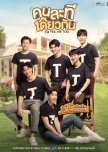
When I first watched this series some time ago, I did not know ANY of the actors (yeah, I don't know how I managed that, either) -- and I still liked it. So, it's not all fanservice here. It does feel like a low budget, Covid-influenced production; most of the scenes take place in or around the house, there's only a small cast of characters, it still manages to tell a good story about six people who find strength and support in each other.
One aspect I am not a fan of is the sub-plot about the father, which was a bit too "lakorn"-ish for me. But it's thankfully only a small part of the series.
I love the credit song and it's text -- it's been stuck in my head since I started rewatching this a few weeks ago, and the text is such a comfort.
A short note on the title, "I'm Tee, Me too" is okay -- but the Thai title คนละทีเดียวกัน is great and has many meanings in one sentence!
Maybe like this: คนละ = to each one, each one differently -- ที = Tee -- เดียวกัน -- identical, same.
Or: คนละ = to each one, each one differently -- ทีเดียว = quite, very; a single occasion -- กัน = each other, together.
Or you could read every syllable on its own as one word each; here's a link, and you can find your own translation http://thai-language.com/?blu=pLnF0LfV4LTVwseh0bkI
All of the Tees get their own story, their own problems they have to live with -- and I like how their psychological issues are not completely healed at the end. In that way, the series takes issues of the mind very seriously. And at the same time, the way the problems and the "solutions" are presented are hilarious.
This good balance of comedy and deeper meaning makes it a drama that is well-worth watching.
Esta resenha foi útil para você?

Third time's the charm? Not here.
They say "third time's the charm" in English, so I watched it up to the third episode. I won't watch any more.This is now almost to the one-third mark, and I still have made no emotional connection to any of the characters whatsoever (maybe the hat guy, but that's just because I like hats).
The script is formulaic -- there's the secret crush from highschool, the womanizing tsundere alpha-male-type "top", the spurned ex-girlfriend, the comedic sidekicks, the engineering setting, the sick family member and subsequent money troubles etc.
The acting is bland and uneven -- it's probably mainly the script, but also I think directing choices.
The sets show the low budget, especially in the university spaces.
The GL couple also feels as if someone said: "Oh, GL is all the rage now, let's put that in." and nobody gave even the smallest thought on how a girls couple could work. All their interactions are so ... bizarre.
The roles for the main actors feels like they tried to squeeze into ill-fitting jackets -- especially for Konprot, who they tried to make into a typical "bottom"-type of character with his gentle demeanor, soft voice and the haircut. Thing is, he shouldn't have to: "Manly" men can also have secret crushes, and just because one is the "alpha-male" type, doesn't mean the other cannot be. (That's not to say that bulky and tall men can't be soft-spoken or gentle or shy or whatever, it's just so obvious that the people responsible here thought there should be a stereotypical "bottom").
I wonder what happened here. Did they not find other actors for the script? Did they not find another script for the actors? Or was it initially planned as a parody, and that information got lost somewhere?
Because this series could have been a great parody of the Thai college BLs of past years. Everything is already so over-the-top stereotypical. Then you get a cast that is actually not at all suited for the roles -- which could be played as a strength in a parody. If the director and the actors would have been just a bit more daring to really get into the absurd side of things, I would have had a great time.
As it is, this series is one I won't finish.
Edit: Please note how I did not say a word about subtitles -- even if those were better, the drama's problems would stay the same.
Edit 2: I watched episode 8 with half an ear. "I like women. I like Konprot now." The writer *actually* did a Gay For You and wasn't even ashamed to let Pluem say it out loud?! Unbelievable...
Esta resenha foi útil para você?

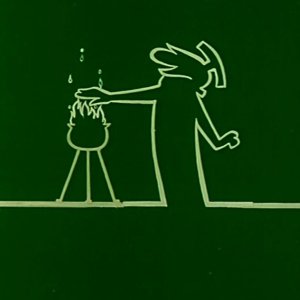
 4
4













